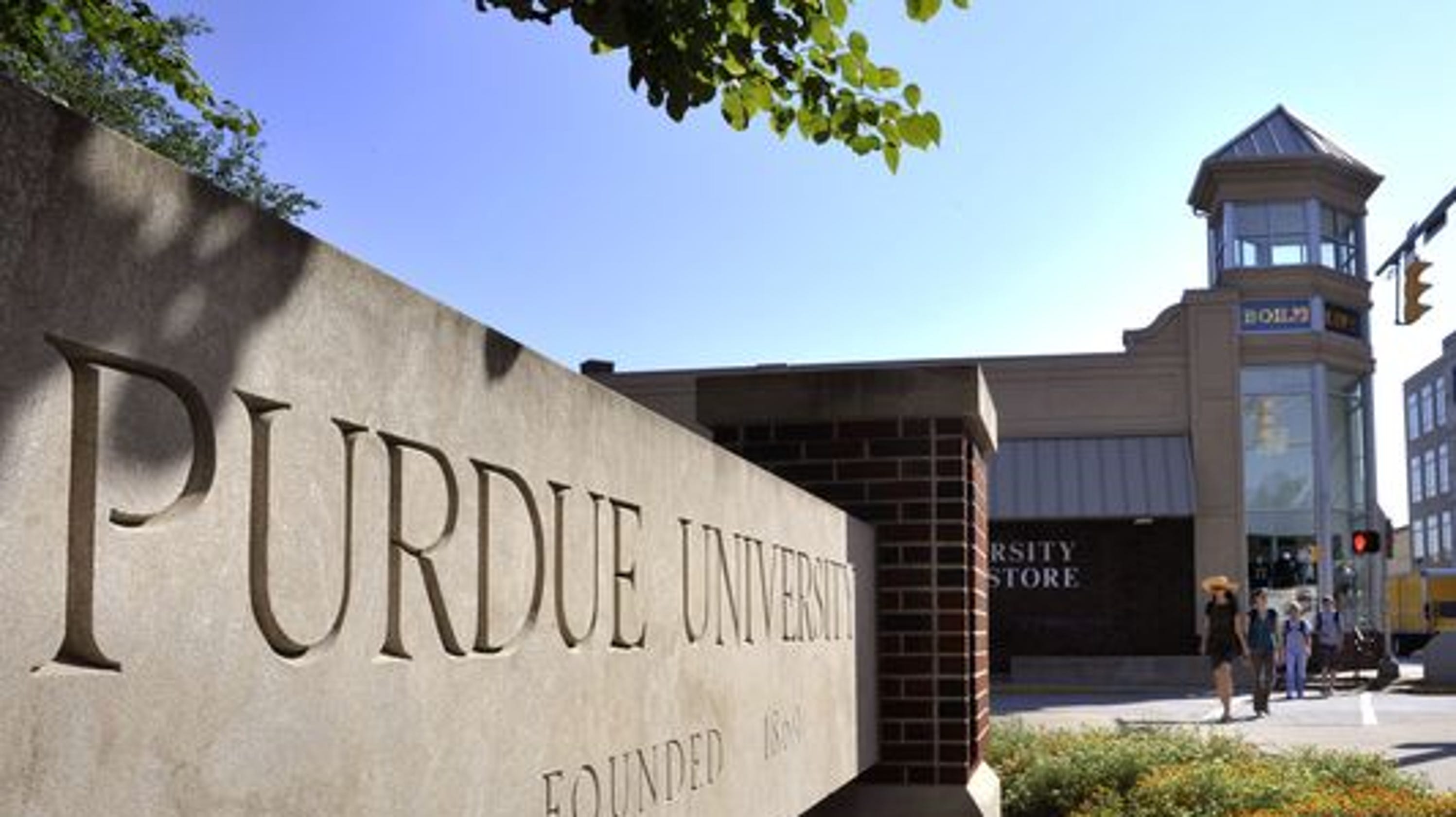5 Questions With The Purdue University Krannert School of Management

In our latest installment of the MetroMBA “5 Questions” series, we speak with members of the Purdue University Krannert School of Management. The business school is introducing a new Online MBA program, arriving early 2020.
1.) Why Was the Time Right for Purdue to Introduce an Online MBA?
“It’s an exciting time for Purdue University and the Krannert School of Management, with many new online initiatives, all of which have business components. From professional students to corporate partners, the flexibility of online delivery is a requirement. Because of this, now was the right time to rethink how Krannert is engaging online strategically and the first step in that strategic plan is offering our MBA fully online.”
2.) What Will the Program Offer That Other Online MBA Programs Don’t?
“At the Krannert School of Management, we are very focused on the ROI for the graduate in conjunction with an exceptional student experience. The Purdue Online MBA will focus on preparing the student for a technological world and provide an exceptional student experience via team-based coursework, experiential learning and excellent student support, all the while limiting cost to provide the high value that is expected from a Krannert program.”
3.) Is This a Sign for More Online Programs to Come at Purdue Krannert?
“Yes, Krannert will be launching a series or additional courses, certificates and master’s programs that build off the framework provided by the Online MBA program. Opportunities include topics such as: business analytics; leadership, negotiations & change management; innovation & tech commercialization; economic policy; and interdisciplinary options. Collaborations across the Purdue campus will provide a rich set of offerings and flexible pathways, allowing students to use course and certificate work to build to a full degree.”

4.) For Potential MBA students, What Would You Say is an Advantage in the Online Program in Contrast to Full-Time or Part-Time Programs?
“All three are great options that serve a different need and it is a very individual choice on which modality is best for the student. If flexibility is the primary need, the online program is the best option. The ability to fit the program in at your own pace and on your own schedule from anywhere in the world is a huge advantage for working professionals. Online programs also have richer elective options than many part-time programs.”
5.) What is the Perfect Kind of Student for the Purdue Krannert Online MBA?
“The Purdue Online MBA program from Krannert is designed for working professionals. A perfect student would be someone with 3–10 years of working experience who is moving into a team lead, management position or looking to start his or her own business. We emphasize analytics throughout the curriculum so potential students should be analytically minded and appreciate technology, although we do expect students from both STEM and non-STEM undergraduate programs to be part of the MBA program. Finally, the ideal student should be hungry to lead and move their career forward.”
J.P. Eggers, NYU Stern Professor and Vice Dean of MBA Programs, Answers Our 5 Questions

In our latest installment of the MetroMBA “5 Questions” series, we speak with J.P Eggers, Associate Professor of Management and Organizations and the Vice Dean of MBA & Graduate Programs at the NYU Stern School of Business. Eggers talks about the MBA program’s new healthcare specialization, what students need to know before enrolling, and what makes NYU stand out when it comes to the business of healthcare.
1. Why Do You Believe The Time Was Right For NYU Stern To Introduce An MBA Specialization In Healthcare?
“Healthcare is an incredibly important part of the U.S. and global economy, and even more central to New York City given the hospital systems, pharmaceutical companies, and insurance providers within the broader region. As a result and in line with Stern’s continued push to diversify the opportunity set for our students, this became a priority to make our ambitious goals in the healthcare space something visible and public.”

J.P Eggers, Associate Professor of Management and Organizations and the Vice Dean of MBA & Graduate Programs at the NYU Stern School of Business
2. What Particular Kinds Of Applicants Do You Believe Are Right For This Kind of Program?
“This specialization is a good fit for applicants interested in the health system broadly. The curriculum options range from insurance markets to pharma strategy to health-tech, so the scope is ambitious. We expect that students with an interest in finance and marketing roles within health-related companies, or those interested in consulting or banking opportunities with a focus on the health sector, will be most drawn to the specialization.”
3. Is This A Sign Of More Unique MBA Specializations Coming To NYU Stern?
“We take our investments in specializations seriously, having been the first school to offer a FinTech specialization and having a broad range of specializations available. But we’ve found that many students have very specific interests when enrolling in an MBA program, and we will continue to explore and evaluate other opportunities.”
4. Since NYU Stern MBAs Can Study Three Specializations, What Are Some Other Specializations You’d Recommend For Someone Studying Healthcare?
“Since healthcare is a ‘vertical’ (industry) specialization, I expect that any of our ‘horizontal’ (functional) specializations would pair nicely. For those interested in pharma roles, I would think that corporate finance, marketing, or strategy would make sense. For those looking at health systems or consulting, I’d think operations may be a clear fit. And for those interested in health tech, our product management, analytics, and innovation specializations may make sense.”
5. Are There Any Unique Organizations In New York That Will be Part of the Healthcare Specialization?
“As part of Stern’s continued commitment to leveraging the amazing resources that NYU has to offer, we will work with both the NYU School of Medicine and the NYU Wagner School of Public Service on aspects of the specialization. The integration of the health-focused track in the Endless Frontier Labs means that we will utilize our connections to the NYC startup ecosystem. And we will continue to explore potential partnerships beyond those.”
To learn more about the NYU Stern MBA programs and specializations, head over to the official school website.
Penn State Smeal Director of Admissions Answers 5 Burning MBA Questions

In our latest installment of the MetroMBA “5 Questions” series, we speak with Michael Waldhier, the Director of Admissions at Penn State University’s Smeal College of Business. Waldhier talks about the close-knit, collaborative community at Smeal, his alumni experience, and the many activities, clubs, and opportunities available for students. He also shares about the 150-year-old Penn State Berkey Creamery—excuse us while we go grab some ice cream!

Michael Waldhier, Director of Admissions at Penn State’s Smeal College of Business
1. What is the Smeal College of Business’ greatest asset and what do you wish MBA students knew more about?
“Rather than discussing our #1 ranking in supply chain management or the fact that Penn State has the largest active alumni network in the country, I honestly think our greatest asset is our class—specifically the individual, tightly-knit, collaborative atmosphere that exists in our MBA program. We only accept 60 students per year in the resident MBA program, which allows for an unparalleled amount of interaction within the cohort, and ensures that faculty and staff build strong, personal relationships with everyone in the class.”
2. What makes the Smeal College of Business a special place for you?
“In addition to being Director of Admissions, I am also an alum of the Smeal MBA program, and remain extremely close to most of my classmates and many of the professors who still teach in the program today. After graduation, I was fortunate to land a principal role in strategy consulting and had the wonderful opportunity to travel extensively over the course of my career. When it was time to transition to something new, returning to Penn State, to ‘Happy Valley,’ and to Smeal was an easy decision for my family to make. This program had an enormous positive impact on my life and set me on the path to success, and I can’t think of any better way to pay it forward to future generations of Smeal MBAs than to be where I am today.”
3. How would you describe the culture of the Smeal College of Business? Is it more collaborative or competitive?
“As mentioned, given the small size of our MBA community and the amount of teamwork that is required throughout the experience, our program is extremely collaborative, so much so that students often help each other to broaden networks, land internships and jobs, and even study for exams. We put a lot of emphasis upon collaboration and teamwork, and students will recognize each other for positive contributions to the program that are aligned with the Penn State Values of integrity, responsibility, excellence, respect, discovery, and, of course, community.”
4. How does Smeal help MBA students pursue their special interests?
“While the MBA program itself may be very small in size, Penn State University is one of the largest in the nation, and there are activities and special interest clubs and groups for virtually everyone. Within the MBA program, we have numerous clubs and associations for students to join such as the MBA Association, Consulting Club, Net Impact, Finance Association, Military and Veterans MBA Association, and more. In addition, students have access to courses across the university if they want to explore a topic outside of the core Finance, Marketing, Supply Chain, and Consulting concentrations. To that end, we have packaged optional programs of study in nearly 20 topic areas, with more being added each year. This allows students the flexibility to customize their MBA experience and pursue just the right mix of coursework to satisfy any career or personal interest.”
5. What is your favorite part of the Penn State campus?

“There are a plethora of wonderful hiking and biking trails in the mountains surrounding Penn State, but the Arboretum is a special place where one can walk through gardens inspired by cultures across the world and study or relax amidst fountains and koi ponds,” Waldhier says.
A lot of people will talk about the Penn State Berkey Creamery, which has been making ice cream for over 150 years, or Beaver Stadium, one of the largest college football stadiums in the United States, but one of my favorite places on campus is the Penn State Arboretum. There are a plethora of wonderful hiking and biking trails in the mountains surrounding Penn State, but the Arboretum is a special place where one can walk through gardens inspired by cultures across the world and study or relax amidst fountains and koi ponds. It also helps that it is right next door to the Smeal College of Business, so students frequently go there after class for team meetings or to relax and unwind after a stressful day.”
Where Should I Work? Boston Consulting Group vs. McKinsey

Whether you’re still in school or you’ve already earned your MBA, it can be a tall order to shuffle through the sheer numbers of job options. Perhaps you’re even fortunate enough to have a number of offers that seem appealing but you’re wondering how to find the best fit.
If you’ve chosen to specialize in consulting, you’re well aware that you’ll be on a large playing field comprised of multiple heavy hitters. Here, we’ll compare two of the biggest draws—Boston Consulting Group (BCG) and McKinsey and Company—which may be helpful in honing in on your dream job.
Where Should I Work? BCG vs. McKinsey
BCG vs. McKinsey: The Interview Process
Regardless where you’ve applied, chances are you’ve readied yourself for an intense interview. No interview is without its stressors, but both McKinsey and BCG are known for a particularly rigorous interview processes. These companies engage potential employees in a two to three round process that includes both a fit and case portions (that is, are you a good match with the company, and can you solve real-world problems with which you’re presented). As discussed in this helpful guide on BCG interview prep, you’ll first be posed with case and fit questions, along with a test of your potential which often takes place in the first round. Candidates are then asked to complete written case examinations, in which they will review a number of documents and submit a response to the case in question.
Like BCG, McKinsey’s interview process can last two-to-three months. According to one source, one of the major differences between the two is that “McKinsey pressure tests to determine whether handling pressure is something you can do … [while BCG] pressure tests not to see if you know what you’re talking about, but rather to see if you really believe what you’re saying.”
McKinsey breaks down its process into three main sections: experience, a multiple choice problem solving test (PST), and case studies. According to one interviewee, “I interviewed with multiple people ranging from engagement managers to partners. No surprises on interview day as McKinsey spends a lot of time with applicants preparing for the case study.”
BCG vs. McKinsey: Compensation
Both companies offer a healthy starting salary with a base of at least $165,000. At McKinsey, recently hired MBAs can make above $200,000 in the initial year, with a $30,000 signing bonus and a performance bonus of $35,000. BCG boasts a performance bonus of up to $45,000, making it the more lucrative of the two for first year hires. Typically, McKinsey sets the standard for salary, and beats BCG to the punch in increasing salary rates.
| Company | Annual Salary | Bonus | Singing Bonus | Total Compensation |
|---|---|---|---|---|
| Boston Consulting Group (BCG) | $167,000 | $45,000 | $25,000 | $237,000 |
| McKinsey and Company | $165,000 | $35,000 | $30,000 | $230,000 |
While responsibilities at each firm are similar for a newly hired MBA, job title varies slightly. At McKinsey, the title is Associate, while at BCG it is Consultant. Finally, for further comparison, McKinsey and BCG and Bain (the other third of the Big Three) pay around 20 percent more than the “Big 4” accounting firms.
BCG vs. McKinsey: Culture
For many people, culture is the deciding factor when choosing between two potential companies. It can be one of the most important elements of a job, over and above the more tangible benefits. According to Management Consulted, at McKinsey, associates “are trained to attack a problem in a certain way – no matter which global office you’re in or at what level, you can count on the McKinsey Way.” According to many, McKinsey’s culture is considered formal and “buttoned up.”
As for BCG, one employee describes their experience as follows:
“Lovely people and flat leadership structure allows for a great culture that promotes camaraderie and encourages learning between peers and from people above you.“
Another employee sang the praises of its “fancy offices.” The company is known as a trendspotter, and has the reputation for a customized approach to getting and retaining clients. McKinsey is known for its lengthy client relationships and a focus on reporting.

Company retreats are the norm for McKinsey, with many of its global offices taking part in a strong, welcoming culture.
BCG vs. McKinsey: Geography
BCG and McKinsey’s home offices are both in the U.S. (Boston and New York, respectively) and both have global presence. McKinsey has the most offices worldwide at 65, and the largest number of consultants. BCG’s global reach covers 50 countries. New hires can expect to travel extensively at both companies, with the expectation being four days of travel to client sites and Fridays in the home office.
BCG vs. McKinsey: Career Development
Both firms adhere to the ‘up or out’ rule of promotions, that is, after two years one decides whether they will stay or depart. Upon remaining at BCG, employees find a large number of opportunities for professional growth. Top performers receive rewards such as a part in a strategic project along with their international counterparts.
According to their site, “Every new BCGer is hired with the belief that he or she will be a long-term employee, capable of substantial professional and personal growth within the firm. We recognize and value each individual’s desire for world-class opportunities.”

“Every new BCGer is hired with the belief that he or she will be a long-term employee, capable of substantial professional and personal growth within the firm. We recognize and value each individual’s desire for world-class opportunities,” the company says.
At McKinsey, associates are assigned early on to specific practice areas. With two tracks, a subject expert and a generalist tract, the company encourages employees to be flexible in acquiring new knowledge and skills that will help them to grow. Notably, McKinsey encourages applicants to join the company who may have gotten an MBA but who have a prior non-business degree. According to Management Consulted, “If your education and/or work experience is ‘outside the norm,’ McKinsey is more likely to consider you than BCG”.
Both McKinsey and BCG are ahead of the curve in assigning new hires to specialty areas, as many firms wait until hires advance to senior levels to assign their practice focus.
BCG vs. McKinsey: Recruiting
McKinsey, as mentioned above, was one of the first management consultants to hire recent graduates of MBA programs as opposed to seasoned managers. They continue to engage in this hiring practice, as does BCG but to a lesser degree. Both firms hire on a locked-in schedule, with recruiting cycles beginning in the fall. It’s important to note that existing consultants have a greater influence upon hiring decisions than recruiters.
BCG notes that “Our case teams share many similarities with MBA study groups, brainstorming together to create maximum value.” Though their hiring process is rigorous, once they do hire, the possibilities are numerous for growth potential at both firms.
While it may seem obvious, it’s important to point out also that alumni from either company have a great chance of future growth at other firms.
5 Questions with the Senior Associate Dean of MBA Programs at BU Questrom

In our latest installment of the MetroMBA “5 Questions” series, we speak with Barbara Bickart, the Senior Associate Dean of MBA Programs at Boston University’s Questrom School of Business. Bickart talks about the qualities MBA candidates possess, unique opportunities for MBA students, and things to do in Boston.
1. Why should an MBA candidate be excited to apply to Questrom?
“I believe three main factors make our program unique.
First, Questrom has a strategic focus on three sectors that we have identified as drivers of growth in our economy—digital technology, health, and social impact. We have developed unique program offerings as well as vibrant communities around these three sectors, and many of our students participate in one of these programs.
Second, our program is designed so that students can obtain a deep base of functional knowledge and key skills, and start their elective courses in the first year. Our first year is divided into four, seven-week modules. In the first three modules, students take three classes and complete an integrated experiential project. For example, in Mod 3, students take Strategy, Information Systems, and Organizational Behavior while working on a client-based project that addresses strategic issues in one of our three sectors. Through this process, students learn to view and solve problems from a multi-disciplinary perspective. Students can start taking elective courses during Mod 4.

Barbara Bickart is an Associate Professor of Marketing and Senior Associate Dean for MBA Programs.
Finally, Boston is a great place for students studying business, with a vibrant culture around innovation and technology. Our project-based learning draws on the Boston eco-system, and many of our students end up working in Boston or the immediate area.”
2. What type of MBA candidate is the best fit for Questrom?
“Our students come from a variety of backgrounds and experiences. In addition to being smart, intellectually curious, and engaged, the two traits that I would say best characterize our students are that (a) they care about community and the impact of their work on society and (b) they are agile and creative—they are flexible in how they think about and solve problems and look outside the box for solutions.”
3. How does Questrom stay on the cutting edge of MBA education? Is there a unique feature you can highlight?
“We are constantly evaluating and updating our curriculum, with a particular focus on adding more experiential learning opportunities in our courses and co-curricular experiences. Our faculty’s research often drives our elective courses. For example, one of our most popular elective courses is Platform Strategy. This course was developed by Professor Marshall Van Alstyne and is based on his book Platform Revolution: How Networked Markets are Transforming the Economy and How to Make the Work for You (2016, W.W. Norton and Co). In this course, student teams work on consulting projects for major platform-based companies. Past projects have been sponsored by Airbnb, Allstate, Capgemini, eBay, edX, Jawbone, Haier, Huawei, Mahindra, Pearson, PGA, PTC, Siemens, SAP, startups, and many others.”
4. What unique opportunities outside of the MBA curriculum make Questrom stand out?
“Our student community is active and engaged—there is always something going on here at Questrom. Students take advantage of the Boston ecosystem—attending networking events and conferences, for example, in health and life sciences. Questrom students are also involved Innovate@BU, which is a BU-wide initiative supporting student-led innovation and entrepreneurial activities. Students take advantage of the Build Lab IDG Capital Student Innovation Center, which is an on-campus co-working space for collaboration and new ventures. The Questrom School of Business Internship Fund provides financial support our students interested in exploring internships at not-for-profits. Finally, we offer a number to global learning opportunities, both in our curriculum and via student-run trips. Groups travel to Paris to study luxury marketing, South Africa to study social impact, Israel to study entrepreneurship, Vietnam to study manufacturing, and Silicon Valley to learn more about digital technology.”

“The views of Cambridge and Boston are amazing. I particularly love walking along the Charles during the Head of the Charles rowing races in October,” Bickart says.
5. What’s your favorite activity in Boston? Why?
“My favorite activity in Boston is to walk along paths on the Charles River. From my office, it takes just a few minutes to get to this path. The views of Cambridge and Boston are amazing. I particularly love walking along the Charles during the Head of the Charles rowing races in October. The races are exciting and fun to watch, and there is a lot of energy in the crowd.”
Virginia Tech’s Director of MBA Programs Answers 5 Questions

In our latest installment of the MetroMBA “5 Questions” series, we speak with Dana Hansson, the Director of MBA Programs at Virginia Tech’s Pamplin College of Business. Hansson talks about the school’s culture, the faculty, and the networking opportunities available for students.
How would you describe the culture of Virginia Tech Pamplin?
“We are a community of professionals seeking greater opportunities through learning and networking. Our faculty scholars love to teach graduate students and build relationships,” says Hansson. “Our student body is engaged, curious and supportive. Our MBA program is flexible, allowing you to choose the pace, which meets your lifestyle and select courses to expand your horizons.”
According to Dean Robert Sumichrast, “Pamplin has large and expanding programs in Northern Virginia, including our MBA and other planned programs that take advantage of the business and government environment of the Washington metro area.”
What type of student is the best fit for Pamplin’s MBA program (career goals, experience, interests, etc)?
“Pamplin MBA students have professional experience and are ready to take the step in their career, be that seeking a promotion at their employer, shifting from one sector to another or making a pivot to something new such as launching a business concept,” explains Hansson. “Our students are service oriented, embracing the ‘Ut Prosim: That I May Serve at Virginia Tech,’ with many having military service. They enjoy the large and active alumni base, feeling a part of something dynamic.”
Speaking of military service, MBA students with a military background looking to transition to a civilian career or move up the ranks will find lots of support at Virginia Tech. A few of the benefits provided include:
- Military application fee waiver.
- There are Student Affairs specialists available to liaison with the VA on your behalf.
- Financial aid is available including Post 9/11 help.
- Alumni and current students can speak with you about their experience.
If there was just one piece of advice you could give to an MBA applicant considering Pamplin, what would it be?
“Do your due diligence as you explore programs; learn the basics of the program, talk to current students, alumni of the program and faculty,” Hansson encourages. “You will be making a large investment in time and money, as well that from your significant others and employers, so make sure you have chosen the best program to meet your needs.”

Dana Hansson, the Director of MBA Programs.
To help you with your research, Pamplin regularly hosts information sessions all about their MBA programs.
- March 13: Evening MBA Information Session (Northern Virginia Center)
- March 14: All MBA Programs Information Session (online)
- April 9: Evening MBA Information Session (Northern Virginia Center)
- April 17: All MBA Programs Information Session (online)
How accessible are Pamplin professors? Can you give an example?
“MBA program faculty reside in Northern Virginia and have weekly office hours, and are available to meet you at your convenience,” Hansson says. “Emails work well too.”
In terms of faculty and staff, Pamplin is a very small college. This makes it a rather intimate experience. In addition, the school recently appointed “some of the most promising new and accomplished faculty from around the world,” says Dean Sumichrast. He admitted that this was an “intentional change” to increase diversity, raise expectations, and improve faculty research and teaching.
In particular, the school has made prominent strides toward diversity. Among faculty, the percentage of underrepresented minorities is now 16 percent from 0 percent four years ago.
Sumichrast also states, in the same speech, that the college is a very open and friendly environment, “An important part of community is becoming more welcoming and inclusive of everyone, and we have become more welcoming,” he says.
What club would you recommend for a student to check out and why?
“As our MBA program is a part-time offering, our students are busy with life and work,” Hansson explains. “Clubs are not available. However, we offer several networking and alumni mentoring opportunities each semester.”
In regards to networking, the MBA Career Network, launched in 2014, is an opportunity to match MBA students with alumni volunteers. And with a vast Hokie Nation to choose from, there are many mentoring opportunities across Northern Virginia, Richmond, and Roanoke.
As for opportunities beyond clubs, Evening MBA students can choose to participate in a study abroad course to gain international experience. This two-week study abroad portion, allows students to visit several multinational and international corporations, local businesses, and cultural venues.
